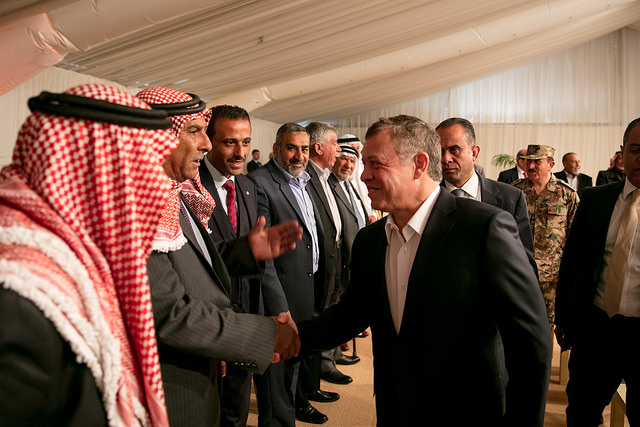King meets Tafileh community leaders, key figures


© أرشيف الديوان الملكي الهاشمي
© Royal Hashemite Court Archives
His Majesty King Abdullah on Sunday met with representatives and key figures of Tafileh Governorate at the Royal Hashemite Court, as part of His Majesty's policy of communicating with all segments of the Jordanian community.
King Abdullah directed the government to accelerate the construction of Tafileh industrial city and complete the project in 2017, noting that a garment factory in the town of Bseira in the governorate will provide job opportunities for 300 women, who will join 400 female employees currently working there.
His Majesty also issued directives to begin work on the new hospital in Tafileh, to have it fully operational in three years.
The King stressed the importance of supporting the agricultural sector and productive projects by funding small enterprises to empower targeted families and improve their incomes.
His Majesty reiterated that the economic situation is the main challenge for Jordan, stressing the importance of coordination among the state's institutions to identify the economic priorities for governorates during 2017-2018.
Parliament should also complete deliberations over investment-related laws to attract more investments this year, thus creating more jobs for Jordanians, the King said.
Acknowledging the challenges facing Tafileh, His Majesty said he will instruct government and state institutions, as well as officials at the Royal Hashemite Court to take the necessary measures to address them.
Turning to the security situation, the King reaffirmed his confidence in the Jordan Armed Forces and security agencies, which are undergoing continuous development to take on any challenges that may arise.
Moreover, His Majesty thanked citizens and state institutions for contributing to the Arab Summit’s success, commending the level of coordination among public and private institutions and among military and security services.
The Summit has contributed to bridging the gap between Arab countries and forging common visions to enhance pan-Arab action to deal with the region’s crises, the King said, noting that the gathering witnessed important meetings between the participating leaders.
For his part, Royal Hashemite Court Chief Fayez Tarawneh said that His Majesty had directed officials at the Royal Hashemite Court to implement several initiatives to complement government measures and further serve the people of Tafileh.
Under royal directives, initiatives in the upcoming stage will focus on income-generating projects in all governorates and enabling households to establish small- and medium-sized businesses that enhance their income and create jobs, in coordination with local societies and institutions.
In Tafileh, the projects include the funding of productive enterprises that target limited-income families, building 30 additional housing units for underprivileged families in coordination with the Ministry of Social Development, establishing a day centre for the rehabilitation of people with disabilities, and revamping a number of public parks by adding recreational facilities and playgrounds for children in Qadisiah and Mansoura.
Interior Minister Ghaleb Zoubi outlined the government’s projects in Tafileh, such as the new hospital, whose cornerstone, he noted, will be laid on 6 April, with the three-year project expected to cost a total of JD43 million.
The minister announced that the JD2-million garment factory in Bseira is slated to be officially inaugurated on 5 April.
Other projects include the expansion of Dana Nature Reserve’s guesthouse, at a cost of JD1 million. It will be inaugurated next week.
He also underlined the projected Tafileh wastewater treatment plant, whose cost stands at JD21 million.
Some 45 per cent of the industrial city project has been completed, the minister said, adding that the total cost is JD6. 5 million, while 95 per cent of a project to develop Tafileh’s downtown has been completed, at a total cost of JD8 million.
Moreover, 30 per cent of the Sheikh Sabah Al Ahmad Al Jaber Al Sabah School has been completed.
For their part, representatives of the local community and civil society institutions expressed appreciation for the King’s keenness to communicate with Jordanians at all levels and to listen to their concerns about the challenges that face their regions, as well as his role in achieving sustainable security and development.
They presented various requests related to economic support to the local community and accelerating work on vital projects such as the industrial hub and the hospital, as well as increasing support for Tafileh Technical University.


